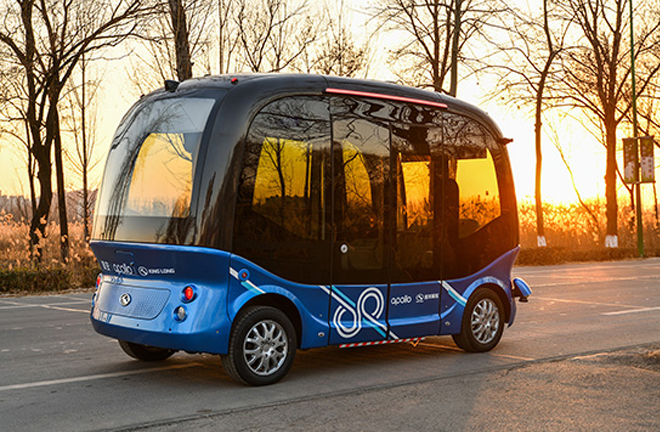Xiongan on course to become a smart city

Baidu’s Apollo autonomous driving vehicle is tested in Xiongan New Area.
Xiongan New area has attracted many high-tech companies though its overall planning has yet to be approved. In addition to state-owned enterprises, companies like Baidu, Alibaba and Tencent have already opened offices. The new area is poised to become a model for innovation-driven development and reforms instead of focusing solely on traditional industries and real estate.
Around the world, smart cities are being built as an effective solution to urban malaise. For example, New Jersey is near New York. Haifa, city of innovation, is not far from Tel Aviv in Israel. Also, Tsukuba, a highland of high-tech sectors, is 50 kilometers away from Tokyo.
Alibaba Group and Xiongan New Area signed a strategic cooperation agreement in November 2017, to establish in the new area the AI-powered “ET City Brain” based on cloud computing and internet of things. The technology has been deployed in Hangzhou, Suzhou and Macao Special Administrative Region for traffic optimization. For example, with its massive cloud computing and data processing capabilities, City Brain can control traffic signals and optimize the flow of vehicles in Hangzhou by identifying the quickest route for emergency vehicles to arrive at the scene within the shortest time frame.
Also, the council of Baidu’s Apollo autonomous driving program currently has over 70 members, claiming the largest partner ecosystem of its kind. Representatives from the council, like Bosch, Continental and Ford, were invited to the Baidu First Council Meeting held in Xiongan in December to discuss the application of autonomous driving vehicles in Xiongan and places beyond. A decision was made during the event that Xiongan will permanently hold the council meeting in the future.
Reams of data are needed to serve the new technologies in the new area, such as ET City Brain and autonomous driving. It is crucial to develop a network of data and apply it to various domains.
Other cities have begun digitization based on already developed infrastructure, but Xiongan has the advantage of developing them at the same time, Baidu President Lu Qi said.
The construction of a smart city requires us to share and use data in a legitimate way, so there won’t be isolated information. Meanwhile, we should deal with the threats posed by hacker attacks and communication interruption. This is a greater challenge in Xiongan, said Tan Xiaosheng, Chief Security Officer at 360 Technology.
The article was edited and translated from China Youth Daily.
(edited by MA YUHONG)
